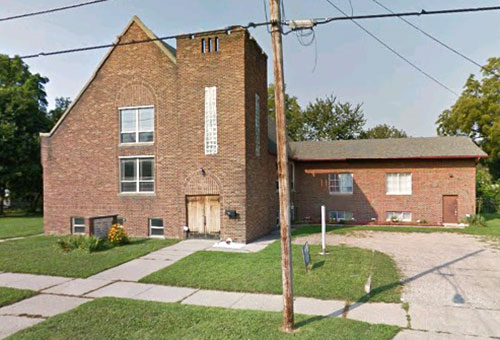By Bill Hammond

First Church of the Brethren in Flint, Michigan.
The following report from Bill Hammond of First Church of the Brethren in Flint, Mich., was received Feb. 2. He reports on the water crisis in Flint and the role the Brethren there are playing in helping to serve the community:
We rent our church building on a shared basis with another congregation and are cooperatively serving as a Distribution Center for water in our neighborhood. Today is the first day we have distributed water.
Things are happening very fast in Flint right now. After many months of no attention we are now swamped with it. There has been a tremendous outpouring of support from across the country and around the world. We are quite challenged with the abundance of bottled water coming into Flint right now. Any churches, agencies, and empty buildings are serving as temporary storage spaces to handle the capacity. We know the attention will die down and the donations will dwindle. We do not yet know how long this crisis will last.
The problem for Flint is a problem of aging infrastructure and an extremely negligent decision to not properly treat the water when it was taken from our local river instead of the Detroit-owned pipeline from Lake Huron. Flint had drawn water from the pipeline for more than 50 years.
The decision to take water from the river allowed very corrosive water to eat at pipes, and those houses that still had lead service connections or lead internal plumbing began to have lead leach out into the water.
This situation was compounded by Michigan State not monitoring properly, not requiring the correct treatment, and even hiding the test results.
There have been several amounts of money designated for Flint’s water issues but as of yet there is not sufficient funding to replace the infrastructure. There also is not yet consensus as to just what course to follow.
Flint has been returned to the Detroit-sourced water supply, and a protective biofilm is being built up on the lead piping. But the tests are still coming in high for lead content in the water, so the emergency continues.
The status at the church: We have had the water tested at the church, but do not know yet if there is a problem with lead in the water. Given when the building was built we may have lucked out. Most lead service connections were phased out in the 1930s. Our building was built in 1937. However we are acting as though the church does have a lead problem, and we are using bottled water. Our kitchen is original to the building and sadly in need of updating. We are looking at replacing the counter tops, sink and faucet, and flooring, all circa 1937.
How to help: Do not send water for the time being. Instead, donations are being received to two funds set up by our local Community Foundation: one fund is for repair or replacement of infrastructure, and the other is for children’s health needs. It is anticipated that funds for children’s health needs will be required for at least the next 20 years. Our mayor just announced that private donations have made it possible to begin replacing lead service connections immediately.
There is an opportunity to volunteer with the local Red Cross to help with water distribution. In addition, plumbers unions have been donating their time and materials to install filters and faucets in Flint, and this past Saturday 400 plumbers from around the state helped with that effort.
— Bill Hammond is a member of First Church of the Brethren in Flint, Mich., and serves on the city of Flint’s Water Advisory Committee. His wife is a volunteer with the Red Cross. For more information about needs in Flint and how to help, contact Bill Hammond at whamm511@yahoo.com .